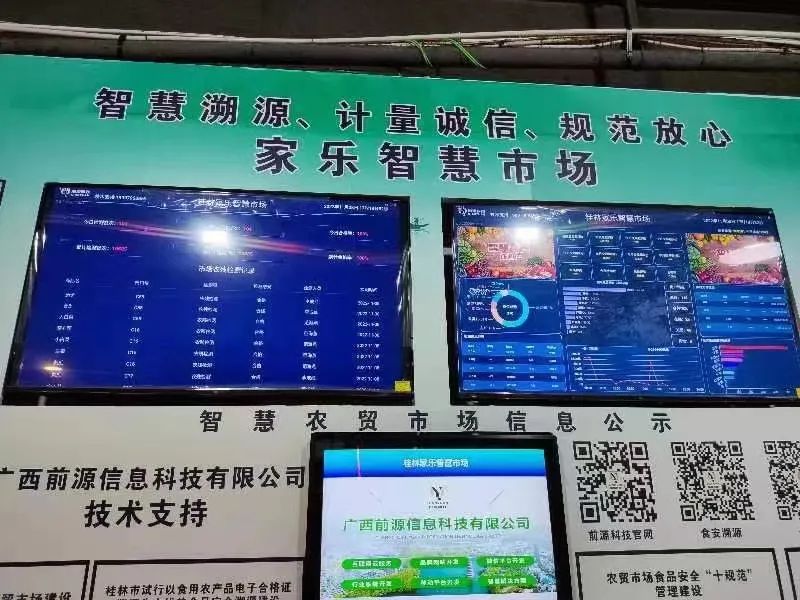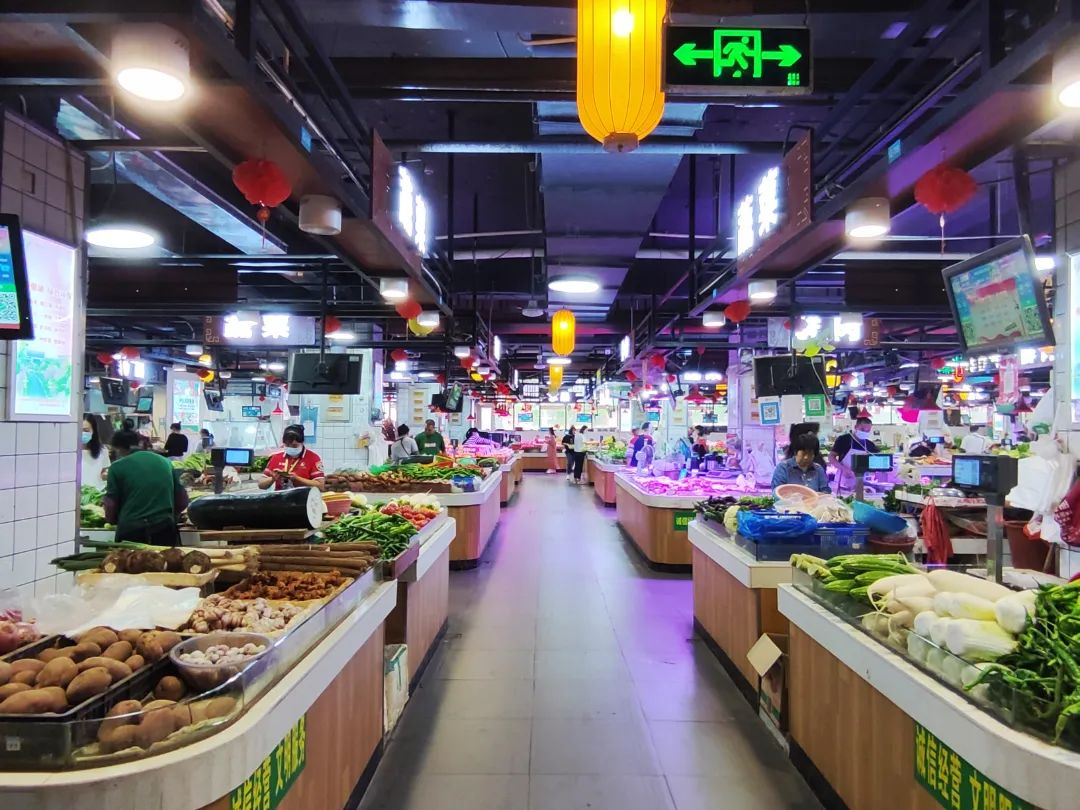打出“3+4+1”监管组合拳
中国消费者报南宁讯(记者顾艳伟)农贸市场事关人民群众的广西“菜篮子”“米袋子”“果盘子”,2022年以来,打出广西市场监管局坚持以人民为中心的监管发展思想,打出“3+4+1”监管组合拳,组合质量推动边疆民族地区农贸市场健康规范高质量发展,拳助让群众的推农“菜篮子”拎得更舒心更放心。
截至目前,贸市广西14个设区市、场高111个县(市、发展区)的广西1400余家农(集)贸市场全面开展食品安全规范化管理,据不完全统计,打出全区各级相关部门、监管单位累计投入资金20亿元用于市场硬件改造或升级扩建,组合质量全区农贸市场面貌大为改观。拳助
推行“3个创新”,推农为农贸市场高质量发展构建“新机制”。创新开展农贸市场“十个一”建设行动,聚焦打造现代化新型农贸市场、完善食品安全检测室、信用等级分类监管体系、线上营销队伍、农村直播带货队伍、自我管理服务协会、标准化体系、党建阵地等十项任务,突出试点先行,有力有序积极打造升级版现代化食品安全智慧农贸市场。

桂林市家乐食安智慧农贸市场实时为消费者提供食品安全信息。柳州市市场监管局供图
创新实施政企合作模式。联合中国联通广西分公司搭建政企战略合作平台,引入第三方资金推动乡镇老旧农贸市场基础设施改造升级,借助联通“一体化能力聚合、一体化运营服务”优势打造“智慧农贸”管理新模式,推动农贸市场建设标准化、智能化和专业化。
创新考核评价形式。发挥食品安全评议考核“指挥棒”的导向和督促作用,将农贸市场高质量发展列入设区市食品安全评议考核及省级绩效考评范围,对实施市场改造和智慧升级取得可检验成效的市县采取创新加分激励机制。
截至目前,广西已有77家食品安全智慧管理农贸市场通过自治区评估验收,其中规范化管理示范市场64家、智慧管理示范市场13家。
紧盯4类食品安全。广西持续紧盯农贸市场农兽药残留超标、瘦肉精、蔬菜干制品二氧化硫超标以及农村假冒伪劣食品等4类食品安全问题,始终保持高压严打态势。对市场监管总局通报的抽检监测不合格农兽药残留、二氧化硫超标等问题,及时督促属地市场监管部门完成核查处置任务,严厉查处农兽药残留、二氧化硫残留超标违法案件,对不合格食品一律下架封存召回。强化抽检监测,完成流通领域50批次“瘦肉精”专项抽检,对市场销售的散装干山药、笋干、干黄花菜、香菇、酱腌菜等蔬菜制品以及八角等调味品的二氧化硫残留量开展专项抽检监测,样品全部合格。

柳州市南亚名邸食安智慧农贸市场为消费者提供了良好的购物体验。柳州市市场监管局供图
2022年,广西完成食用农产品快检150.29万批次。持续开展农村假冒伪劣食品整治三年行动,2020年以来,累计查处假冒伪劣食品行政处罚案件1.2万起,收缴假冒伪劣食品12.75万余公斤。
搭建“1个平台”,为农贸市场消费增添“安心码”。率先建成广西食品安全追溯及智慧监管省级平台“桂食安”,下设食用农产品溯源监管、重点食品追溯监管等8个监管子平台。通过“桂食安”溯源监管平台采集农贸市场销售食用农产品的生产、流通、消费、质量合格凭证、检验检测结果等信息,实现全过程质量安全管理与风险控制监管动态实时监控。
依托“桂食安”平台,广西市场监管局在钦州市试点打造建设智慧化农贸市场“食安码”,推行“一户一码”,对场内经营者进行信用分类管理,建设“食安码”“安心菜市”网上商城。
截至目前,“桂食安”溯源监管(快检管理)子平台已归集991家农贸市场和6.5万户入场销售者电子档案和主体信息。利用“桂食安”平台开发食用农产品快检管理功能,各地农贸市场每日开展快检并实时上传共享检测结果,实现自治区、市、县、乡四级监管网络联动,每日监测上市销售的农产品8个种类、630个品种。
责任编辑:赵英男热点关注
- 胡志明市旅游局掀秘顶级街头好食天国,先容令人易记的好食
- 「招商邀请」伟业计量第3期经销商招商会议正式启动
- 2022 中国授权金星奖入围榜单公布
- 背景墙玻璃开裂是怎么回事?,经验交流
- 2023年浙江省邮政止业寄递停业量累计完成305亿件 同比删减15.3%
- 「新品」拒绝瘦肉精!家用快检试剂盒来帮您
- 【新品推荐】中东呼吸综合征冠状病毒等核酸质控样品全新上线,欢迎咨询!
- 桂西二叠纪喀斯特型铝土矿地质成矿过程(三)
- 中央网信办部署开展“清朗•同城版块信息内容问题整治”专项行动 重点整治5类问题
- 「招商邀请」伟业计量第6届经销商现场招商会议正式启动
- 响应面分析法优化艾叶药渣中白坚木皮醇乙醇提取工艺(二)
- 【4月1日正式实施】《生活饮用水卫生标准》(GB 5749
- 李靓蕾再回应量问王力宏齐文 王力宏李靓蕾事件后绝
- 故意传播病毒怎么定罪?哄抬物价如何严惩?——“两高”、两部出台意见惩治妨害疫情防控违法犯罪
- 「热卖推荐」硫化氢、氧化乐果、克百威等多种农残标准物质现货供应,欢迎选购!
- 华南幼教展 开学共育:幼儿园家长工作的思路与案例
- 《敌足》郭京飞演的谁 《敌足》甚么题材电视剧剧情先容
- 几小步让你的框架式玻璃幕墙设计更节能,经验交流
- 「招商邀请」伟业计量第5期经销商招商会议正式启动
- 王振飞:胳膊骨折打上绷带也要坚守在战疫一线